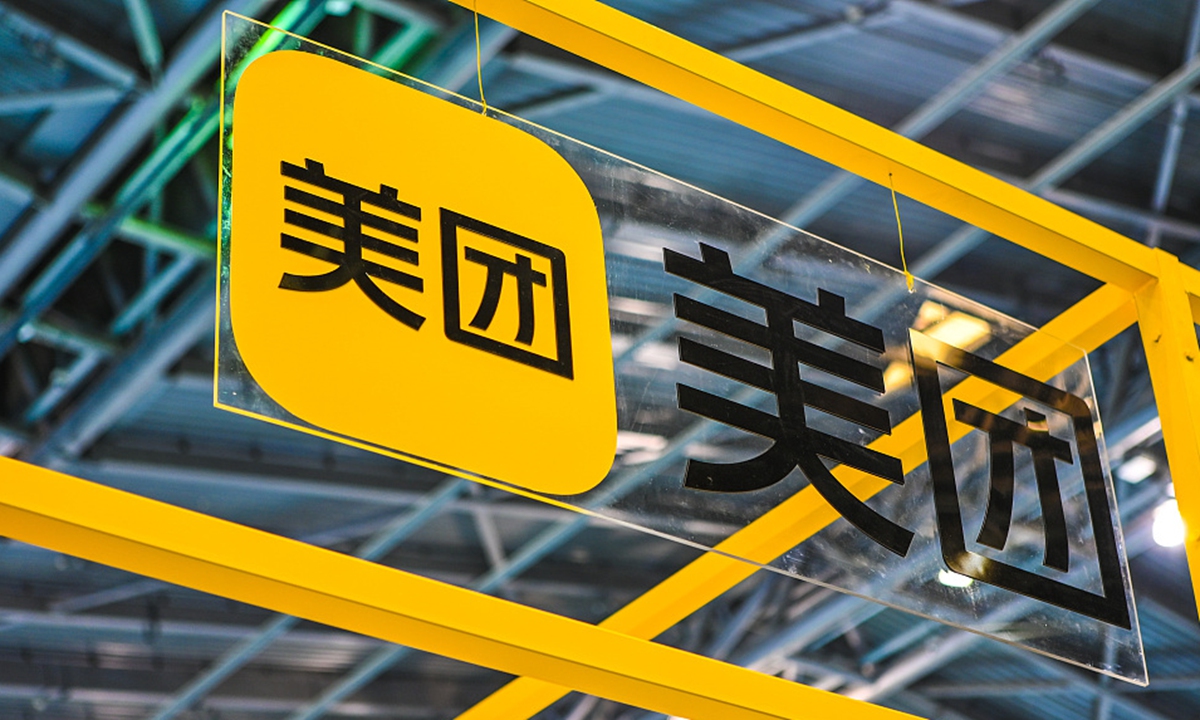China fines Meituan $533m for monopolist practices, milder than Alibaba due to difference in rectification moves
Penalty mild, showing both a warning and a care to internet platforms: analysts

Meituan Photo: CFP
Chinese food delivery platform Meituan was fined 3.44 billion yuan ($533.5 million), or 3 percent of its 2020 domestic revenue, for monopolist practices by China's top market regulator on Friday. The company was also ordered to immediately stop illegal activities and give full refund of exclusive cooperation deposit of 1.29 billion yuan to contracted vendors.
The State Administration for Market Regulation (SAMR) also released an administrative guidance, urging the platform to carry out "comprehensive rectification" in areas including the platform's commission charge mechanism and algorithm rules, maintaining the legal rights of small- and medium-sized vendors as well as strengthening the protection of legal interests of food delivery riders. The company was required to submit self-inspection and compliance reports to the SAMR for three consecutive years.
China's market watchdog in April began an antitrust probe into Tencent-backed Meituan based on the country's anti-monopoly law. The investigation found it had abused its dominant market position since 2018, forcing vendors to sign exclusive cooperation agreement with it by implementing discriminating rates and postponing vendors' store online openings, according to a statement on the website of SAMR.
Meituan also employed multiple measures, including charging exclusive cooperation deposits, using data and algorithm techniques, and imposing punitive measures to ensure vendors "choose one from two." Such moves eliminated and restricted market competition, hindered the free flow of market resources and elements, weakened the platform's innovative dynamic and growth vigor, and hurt the legal rights of vendors and consumers, the SAMR statement said.
In response, Meituan said it will conduct self-investigation and rectification in accordance with the market regulator's written decision, and completely ban the practice of forcing vendors to use their platform exclusively, known as "choose one from two."
The platform also vowed to take the penalty as a lesson, operate in a compliant and legal way, maintain fair competition order and carry out social responsibility.
The penalty on Meituan marks the second-biggest fine on the Chinese platform economy since Alibaba was slapped a record $2.8 billion antitrust fine in April by regulators for exclusionary practices. The amount accounts for about 4 percent of the company's domestic sales in 2019.
Under China's anti-monopoly law, Chinese regulators could fine companies with monopolist misconduct between 1 percent and 10 percent of its revenue in the previous year.
Market observers said that the 3 percent fine is "relatively mild," showing that the Chinese regulator is not resorting to a "one-size-fits-all" approach on antitrust practices, and is more pragmatic and flexible in handling monopolist cases.
"It sends both a warning and a care to platforms. The lower-than-average standard fine shows that the regulator's penalty is not aimed at cracking down on internet companies, but to guide more companies to speak frankly and sincerely about misconduct and actively correct them to build a favorable environment for the industry," Wang Peng, an assistant professor at the Gaoling School of Artificial Intelligence at the Renmin University of China, told the Global Times on Friday.
According to the SAMR statement, Meituan has taken the initiative to recognize its monopolist practices, provide evidence and launch comprehensive self-rectification. SAMR has also taken account of those moves when making the decision on penalties.
Chinese companies were slapped with an average 3.67 percent fine on their revenue in the previous year in anti-monopoly probes between April 2012 and June 2020, according to media reports.
In April, the SAMR summoned 34 internet firms, including Alibaba, Tencent, Baidu, JD.com, Meituan and Pinduodo, urging them to launch self-investigation and make rectification on issues involving "choosing one from two."
Fang Xingdong, founder of Beijing-based technology think tank ChinaLabs, also told the Global Times on Friday that Meituan's case has less social impact and business magnitude, and that's why the fine on Meituan is softer than that of Alibaba.
Analysts said the penalties on Alibaba and Meituan will serve as a sober reminder to China's internet industry, mirroring Chinese regulators' unwavering determination to lead the industry's orderly and regulated development, and to encourage entities to participate in competition - through which China could improve economic efficiency.
"The case of Meituan also carries a special weight as it shows the Chinese government's concern for workers and delivery riders. Technologies are supposed to improve their livelihood, rather than be taken advantage and exploit them," Wang added.
Shares of Meituan gained 2.07 percent on Friday's closing in Hong Kong, before the penalty was announced.

